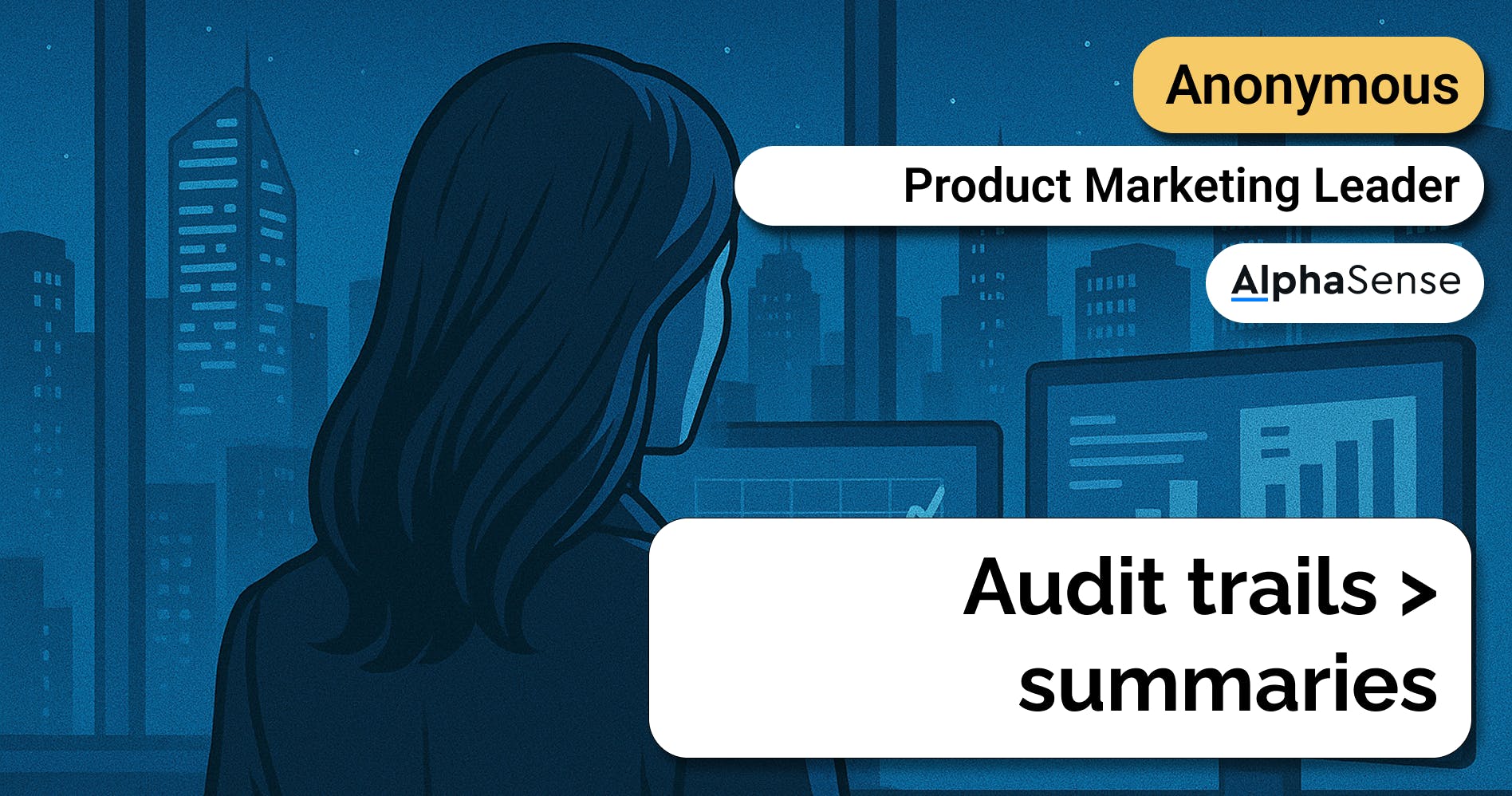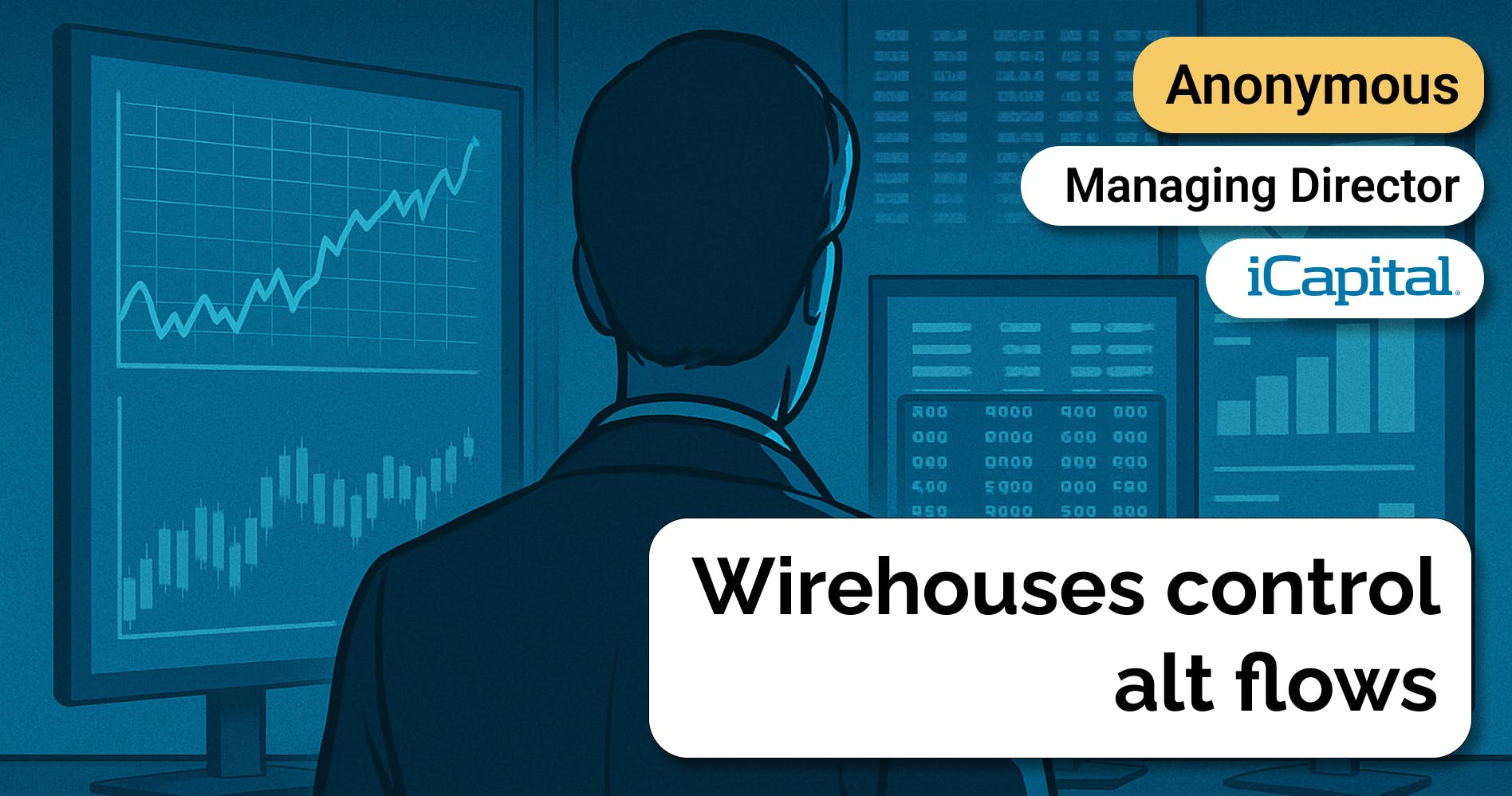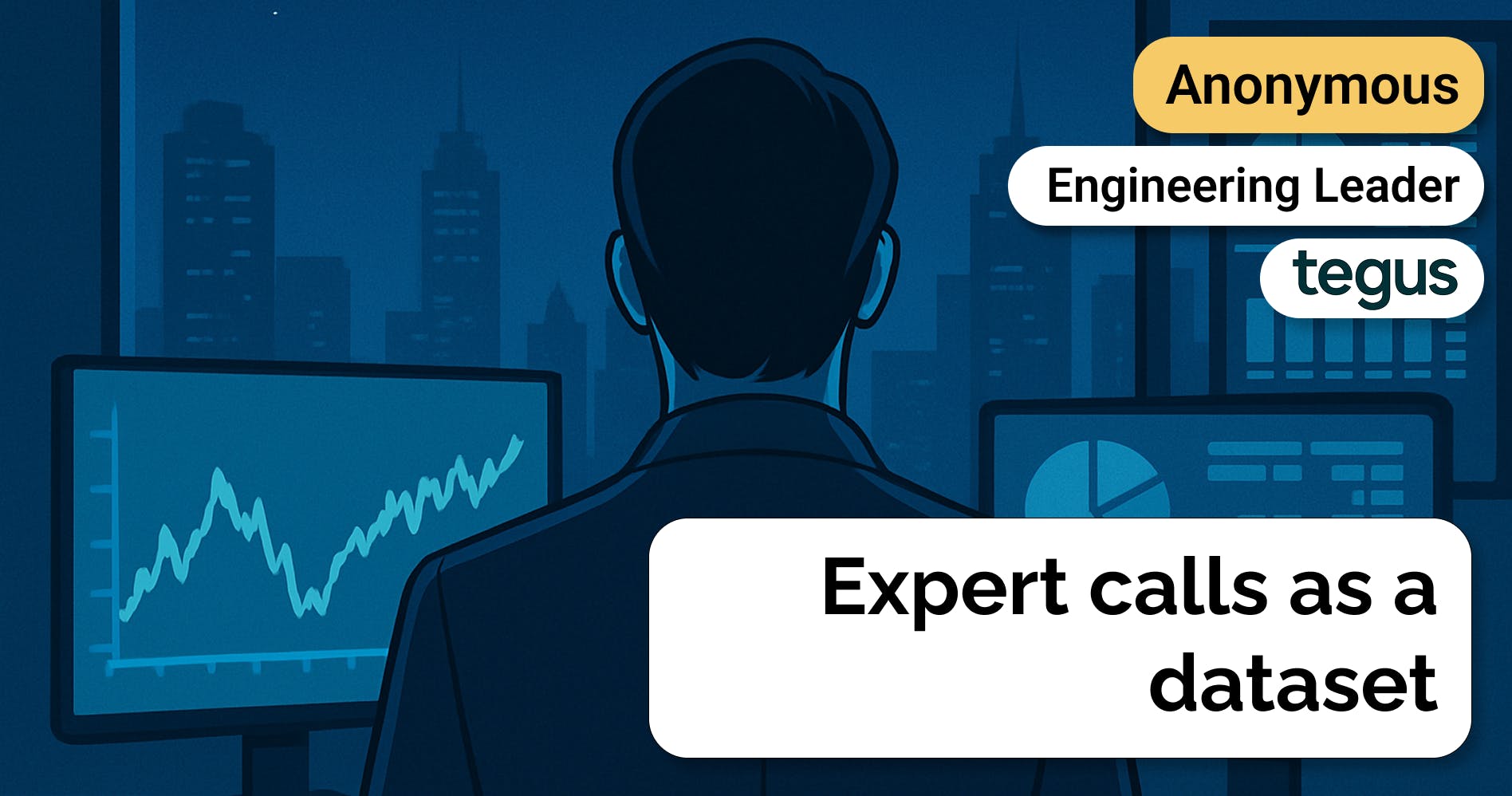Product Marketing Leader at AlphaSense on the evolution of AI-powered financial research
 Jan-Erik Asplund
Jan-Erik Asplund

Background
We spoke with a product marketing leader at AlphaSense who oversaw financial data products and the company's generative AI search offerings.
Our conversation explored how AlphaSense differentiated its AI capabilities through proprietary financial content, enterprise intelligence features, and workflow-specific solutions for financial services and corporate customers.
Key points via Sacra AI:
- AlphaSense is not a thin ChatGPT wrapper — it built a proprietary RAG stack focused on the search/research use-case on top of a finance‑specific content moat (Wall Street Insights broker research, earnings calls, filings, expert transcripts) reinforced by the acquisition of Tegus. "The biggest misconception is that it's just another ChatGPT wrapper for financial search. AlphaSense does use their own proprietary RAG, and they're basically building that stack from scratch... They really created a content moat first with the premium broker research, earnings calls, filings, and expert calls, and then trained the AI model on top of that."
- Enterprise readiness now hinges on integrations and a content marketplace as well as the shift to support API access, encryption, rules‑based access, and single‑tenant SaaS‑like isolation — all backing a dedicated enterprise offering launched last year. "AlphaSense was really trying to elevate their product to be enterprise ready, and it follows a similar pathway as other enterprise software offerings. Really focused on APIs, focused on security, focused on reliability and trusted sources. Because AI often has hallucination problems, bias problems, strictly performance problems."
- Customer signals point to multi‑threaded research and continuous monitoring: analysts increasingly run parallel deep research queries while demanding quarter‑over‑quarter alerts on sentiment and qualitative changes, e.g. “watch for shifts in competitive messaging on this topic.” "Users are no longer going to a single threaded search, read, and export cycle. There's been a lot of workflows or customer research we’ve done where we've seen analysts run a lot of different deep research tasks in parallel. For example, AI semiconductors is one search, GPU supply chain risk is another, and then regulatory sentiment in the US versus EU. Doing those different deep research tasks in parallel in order to really get broader narrative context."
Questions
- Which types of products were you most focused on? Can you walk us through the high priority products?
- AlphaSense had already invested in AI well before the rise of tools like ChatGPT. How did that early foundation shape what became its generative AI offerings?
- What specific investments or product elements made AlphaSense's search technology stand out in the new AI era, with players like Microsoft Copilot also emerging?
- Could you elaborate on the role AlphaSense's proprietary content, such as Wall Street Insights or Tegus Transcripts, plays in its product differentiation?
- When it comes to what enterprise buyers actually want from GenAI, and especially AI agents, what did you see or hear in the market? What do they want, and what do they not want?
- Did priorities differ between financial services and corporate clients? Any contrast in how they thought about GenAI or used AlphaSense?
- When it came to AI and data privacy or security, what kinds of concerns came up most frequently in conversations with customers?
- Based on your conversations, how sophisticated were enterprise customers really in their understanding of AI and concepts like RAG or agents? Were they pretty hands-on or still learning?
- What does the term enterprise intelligence mean internally at AlphaSense? How does it differ from traditional AlphaSense usage, and how does AI fit into it?
- And do you see significant delta benefits from AI when a customer opts for enterprise intelligence versus just traditional use?
- What were common objections or blockers in this market to a product like Enterprise Intelligence? How did the team confront these?
- Was on-prem deployment a game changer in overcoming buyer hesitation?
- Taking a step back in the broader AI and investment data space, who do you see as AlphaSense's real competition?
- Do you see a risk that companies like Microsoft or Google could commoditize enterprise search and AI features for investing with Copilots or Vertex AI? Maybe even players like Perplexity that are starting to focus on market data?
- We've heard that financial customers often run side-by-side evaluations, bake-offs between AlphaSense and competitors. What evaluation criteria really matter in those?
- When it came to positioning AlphaSense's AI products against competitors like Cap IQ, PitchBook, FactSet, Bloomberg, or even AI-first tools like Hebia, what kind of messaging or strategy did you pursue?
- Where do you think AlphaSense needs to go next to maintain its leadership position in AI?
- What's your view on the idea of AlphaSense taking that a step further, evolving from search AI to proactive agents or maybe autonomous recommendation or decision support engines?
- Are partnerships and integrations becoming more important for AI adoption among AlphaSense customers? Any key ones that stood out?
- Do you believe AlphaSense will ultimately play a role in transactional workflows, like powering buy-sell decisions or actual investment ops? Is this where agents come in eventually?
- I'd love to hear what's the biggest misconception people have about AlphaSense's AI or product strategy?
- To wrap, anything else you'd add that we haven't covered? Maybe something unique that you saw internally or with major customers that helps you understand where this market is headed?
Interview
Which types of products were you most focused on? Can you walk us through the high priority products?
Financial data was one product, which came from an acquisition of Sentio, a competitor. That acquisition happened in 2024, followed by the acquisition of Tegus, another competitor. Tegus had acquired Canalyst a few years prior, and that was the integration of financial data. I was also overseeing our GenAI search product—search and knowledge management, which integrates customers' internal databases with AlphaSense's external database and allows you to search on top of that.
AlphaSense had already invested in AI well before the rise of tools like ChatGPT. How did that early foundation shape what became its generative AI offerings?
Because AlphaSense was heavily focused on search through documents, they were doing a lot of search optimization using natural language processing to run through all the information as well as trying to integrate a knowledge management system, sometimes known as research management, and applying those NLP and RAG techniques on top of that information.
What specific investments or product elements made AlphaSense's search technology stand out in the new AI era, with players like Microsoft Copilot also emerging?
It was definitely AlphaSense's proprietary database and knowledge base as well as being able to blend that with asset managers' and different banks' and hedge funds' information. The proprietary information and database was what differentiated AlphaSense from Hebbia and Copilot. AlphaSense is heavily focused on financial firms and their workflows, specifically framing the GenAI tooling from an analyst perspective, whereas Copilot and Hebbia are more generalized search agents.
Could you elaborate on the role AlphaSense's proprietary content, such as Wall Street Insights or Tegus Transcripts, plays in its product differentiation?
AlphaSense has broker reports. They also do expert transcripts similar to Tegus as well as what Sacra is doing currently. They get information from FactSet and Morningstar and then layer GenAI onto it with larger quant datasets. Being able to leverage those different perspectives in information and knowledge is extremely helpful to our customers, and that's one of the main reasons they go with AlphaSense over a competitor.
When it comes to what enterprise buyers actually want from GenAI, and especially AI agents, what did you see or hear in the market? What do they want, and what do they not want?
For enterprise customers, we didn't have an enterprise offering until sometime last year.
AlphaSense was really trying to elevate their product to be enterprise ready, following a similar pathway as other enterprise software offerings. They focused on APIs, security, reliability and trusted sources. Because AI often has hallucination problems, bias problems, and performance problems, having an audit trail and being able to see the reasoning and trace was very important to our enterprise customers.
Because many companies are working with sensitive financial data and customer data, ensuring that data was secure and encrypted were priorities that customers really cared about, in addition to being able to administrate from an IT level and having rules-based access that proliferates across all users, user groups, and integrations.
Did priorities differ between financial services and corporate clients? Any contrast in how they thought about GenAI or used AlphaSense?
Our financial services customers typically include investment banks, hedge funds, private equity, asset management, and venture capital. These customers typically have much stricter requirements for security and reliance on correct and accurate financial data.
They really wanted to understand the reasoning behind AI models. They're actually using it to inform their decision making end to end, versus corporations. Some personas in corporations would include competitive intelligence, corporate strategy, corporate development, and investor relations. Typically, those personas use data and research to inform direction, but not necessarily decision making. They had much less stringent requirements for data accuracy, tracing, and reliability.
Typically, AlphaSense would roll out a product to corporations and consulting first. Then once they got feedback or were able to improve the reliability, it would be rolled out to financial services.
When it came to AI and data privacy or security, what kinds of concerns came up most frequently in conversations with customers?
When it came to data concerns, it's about auditability, tracing, understanding what formulas were being used, being able to get a link to the source document to make sure that it wasn't just making up answers. In terms of data privacy, ensuring that all of the information was basically acting like a single tenant software as a service where it was launched in one instance, all the information stayed in that instance, and it couldn't be accessed by outside parties. Especially for enterprise because many customers were linking their internal knowledge bases with AlphaSense, making sure that pathway is secure and their internal information isn't getting out was critical.
Based on your conversations, how sophisticated were enterprise customers really in their understanding of AI and concepts like RAG or agents? Were they pretty hands-on or still learning?
They're still learning only because financial services tends to be a slower moving industry unless they specialize in software M&A.
What does the term enterprise intelligence mean internally at AlphaSense? How does it differ from traditional AlphaSense usage, and how does AI fit into it?
Enterprise intelligence was really focused around the idea of your internal research and linking your internal research through secure integrations with AlphaSense. It's the same term you'd hear at other companies around knowledge management and research management where you're able to connect the company or organization's drives with AlphaSense in order to supplement internal research with all of AlphaSense's library of documents.
And do you see significant delta benefits from AI when a customer opts for enterprise intelligence versus just traditional use?
Definitely yes because you're able to create memos, meeting notes, and slide decks that integrate AlphaSense data, it's an incremental layer.
What were common objections or blockers in this market to a product like Enterprise Intelligence? How did the team confront these?
Typically, it would be around cost, as well as AlphaSense wasn't previously well known for their financial data. It would be a competitor who had been in the market longer for that, which is why AlphaSense acquired Sentio, but was still running up against other competitors like CapIQ and FactSet with regards to internal or enterprise intelligence.
Was on-prem deployment a game changer in overcoming buyer hesitation?
Not really. On-prem deployment was due to security purposes, but that was the game changer for only a subset of customers.
Taking a step back in the broader AI and investment data space, who do you see as AlphaSense's real competition?
AlphaSense's real competition which we always ran into was FactSet, PitchBook, and also Tegus—before we acquired Tegus.
Do you see a risk that companies like Microsoft or Google could commoditize enterprise search and AI features for investing with Copilots or Vertex AI? Maybe even players like Perplexity that are starting to focus on market data?
I think so. But it would be pretty far out just because a lot of firms are very heavily invested in existing M&A—or analysis-specific workflow tools, and it's part of their everyday lives. The hurdle for adoption is getting a lot higher.
We've heard that financial customers often run side-by-side evaluations, bake-offs between AlphaSense and competitors. What evaluation criteria really matter in those?
The number of sources, the validity of sources, the summarization abilities, its ability to think and answer like an analyst have all been really important. That query sheet and summarization view is what customers really evaluate the different products side by side on.
When it came to positioning AlphaSense's AI products against competitors like Cap IQ, PitchBook, FactSet, Bloomberg, or even AI-first tools like Hebia, what kind of messaging or strategy did you pursue?
We very much tried to lean into our different content sources. The expert insights, the Wall Street insights, our financial data, really leaning into AlphaSense's content and partners as trusted sources for premium perspectives, and then having a centralized place to do all of that and to really streamline different workflows. In the most recent year and a half, we really leaned on use case—and solutions-based product marketing. We tried to narrow it down based on industry, whether it was investment bank, hedge funds, private equity, asset management, or venture capital, or corporations and consulting.
We created industry-specific messaging as well as messaging based on the different use cases. That could be summarizing due diligence calls, building comp tables, benchmarking. We would create messaging and positioning that was specific to use cases, solutions, and the industries, as well as the person's role—if they were an analyst versus the managing director.
Where do you think AlphaSense needs to go next to maintain its leadership position in AI?
AI has to adapt to different decision-making processes across the financial analyst workflow, C-suite, compliance and regulatory teams, and the sales and corp dev areas. For AlphaSense, they've focused on RAG, contextual summarization and sentiment analysis, and search first. Continuing or being able to incorporate more generative AI technology on top of the RAG would be really helpful. In addition to workflow-aware insights and decision personalization, being able to create a memo, a newsletter, creating actual deliverables that analysts and customers would actually leverage—the next step of the research, basically.
First, they're getting all the research from AlphaSense, but what would they create with that research is the next step where AlphaSense could really succeed.
What's your view on the idea of AlphaSense taking that a step further, evolving from search AI to proactive agents or maybe autonomous recommendation or decision support engines?
I don't really see AlphaSense becoming a truly autonomous agentic AI workflow. Their capabilities from an engineering and product perspective are pretty weak in that regard internally. But I could see them driving more autonomous workflows, but not necessarily fully handing that off to an assistant or analyst in a box. It's still a few steps away.
Are partnerships and integrations becoming more important for AI adoption among AlphaSense customers? Any key ones that stood out?
For AlphaSense, they aren't really doing much partnerships. They're really acquiring competitors and trying to integrate that into the AlphaSense platform. But for customers, integrations do matter more now than ever because they're really trying to connect all relevant and trusted data so that AI can access it for better context and, therefore, better answers.
They're integrating with proprietary datasets, third-party content providers, and internal enterprise data sources with tools teams are already using, like Teams, Slack, Salesforce, Office, different CRMs. With regards to AlphaSense, they already do have content partnerships customers can access through their content marketplace, as well as some early integration API hooks that they're able to use. But that's something that customers are leaning heavily into as they are leveraging AI more.
Do you believe AlphaSense will ultimately play a role in transactional workflows, like powering buy-sell decisions or actual investment ops? Is this where agents come in eventually?
No. I don't really see that happening based on the tech debt and engineering and product capabilities that are internally in AlphaSense. It's likely not going to be a heavy focus for them.
I'd love to hear what's the biggest misconception people have about AlphaSense's AI or product strategy?
The biggest misconception is that it's just another ChatGPT wrapper for financial search. AlphaSense does use their own proprietary RAG, and they're basically building that stack from scratch, which is why they've been so slow to do it. They really created a content moat first with the premium broker research, earnings calls, filings, and expert calls, and then trained the AI model on top of that.
Another misconception is that they're trying to chase the same roadmap that Bloomberg, FactSet, and S&P have already laid out and done. Those companies really focus on structured quantitative data and real-time feeds versus AlphaSense is more focused on unstructured insight extraction from documents and word text—themes, tone, consensus shift. AlphaSense's strategy is not necessarily to replace Bloomberg, FactSet, and S&P. It's really to complement that structured data platform as an adjacent workflow instead of a replacement.
Another misconception regarding AI is that it will replace search entirely, but search is still the workflow that most customers and users know. AlphaSense is powering that reading pattern recognition and synthesis on top of search so that users are always still in control before actually accepting the AI synthesis. And tied to that control, there's the defensibility of the content partnerships and proprietary research. So AlphaSense has designed the AI carefully for traceability and auditability and compliance, because the financial services industry is highly regulated.
That bigger idea of supporting workflows is an important idea more so than agentic AI actually taking over those workflows. It's really bringing the AI into the workflow as a trusted partner with users like in search versus taking over entirely because we've seen that there's a lot of issues with AI hallucinations, bias, etcetera, that will always make humans in the loop or subject-matter experts in the loop a required part of any workflow.
To wrap, anything else you'd add that we haven't covered? Maybe something unique that you saw internally or with major customers that helps you understand where this market is headed?
Customer signals for where the market is heading. First, users are no longer going to a single threaded search, read, and export cycle. There's been a lot of workflows or customer research we've done where we've seen analysts run a lot of different deep research tasks in parallel. For example, AI semiconductors is one search, GPU supply chain risk is another, and then regulatory sentiment in the US versus EU. Doing those different deep research tasks in parallel in order to really get broader narrative context.
There's a trend into a similar behavior across segments—document diversity, demand for it. We saw we had to move beyond core filings and transcripts. Looking into ESG reports, more niche trade publications, policy papers with a market perspective. It's also part of broadening beyond investor relationships in that there's corp strat teams, sustainability, and policy teams that are also starting to use these search platforms and AlphaSense more.
Also, always-on monitoring. Alert volume and customization complexity is really climbing quickly. Instead of "send me earning call notes," it's "watch for shifts in competitive messaging on this topic" or "flag sentiment changes in executive language quarter over quarter." More like continuous intelligence rather than point-in-time research.
For customer behavior changes, there's also been executive adoption in addition to end user and analyst and associate adoption. With the enterprise rollout, there's C-suite and VP users who are logging in directly. They're getting more comfortable with AI-assisted synthesis as long as it's traceable and domain focused. Also, that cross-functional spread I mentioned earlier—even more than equity research and investor relations teams, there's the corp dev, product strategy, sales enablement, marketing, and procurement teams starting to use these tools more. These signals are very aligned to the macro market signals in terms of AI taking over more markets and functions.
Also, consolidation of content providers, like the Tegus acquisition. These will all be really important in where AlphaSense is headed next and where they intend to go.
Disclaimers
This transcript is for information purposes only and does not constitute advice of any type or trade recommendation and should not form the basis of any investment decision. Sacra accepts no liability for the transcript or for any errors, omissions or inaccuracies in respect of it. The views of the experts expressed in the transcript are those of the experts and they are not endorsed by, nor do they represent the opinion of Sacra. Sacra reserves all copyright, intellectual property rights in the transcript. Any modification, copying, displaying, distributing, transmitting, publishing, licensing, creating derivative works from, or selling any transcript is strictly prohibited.











